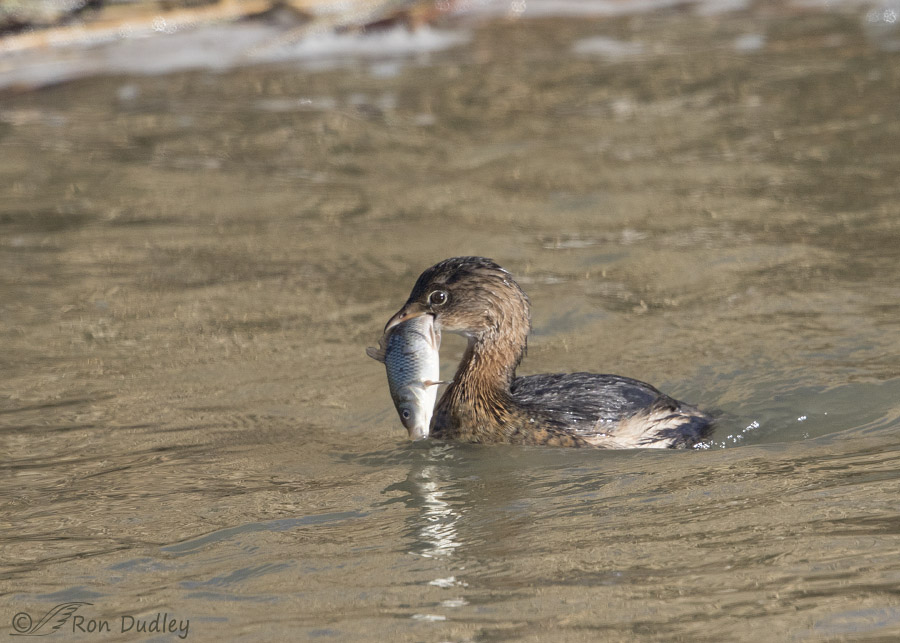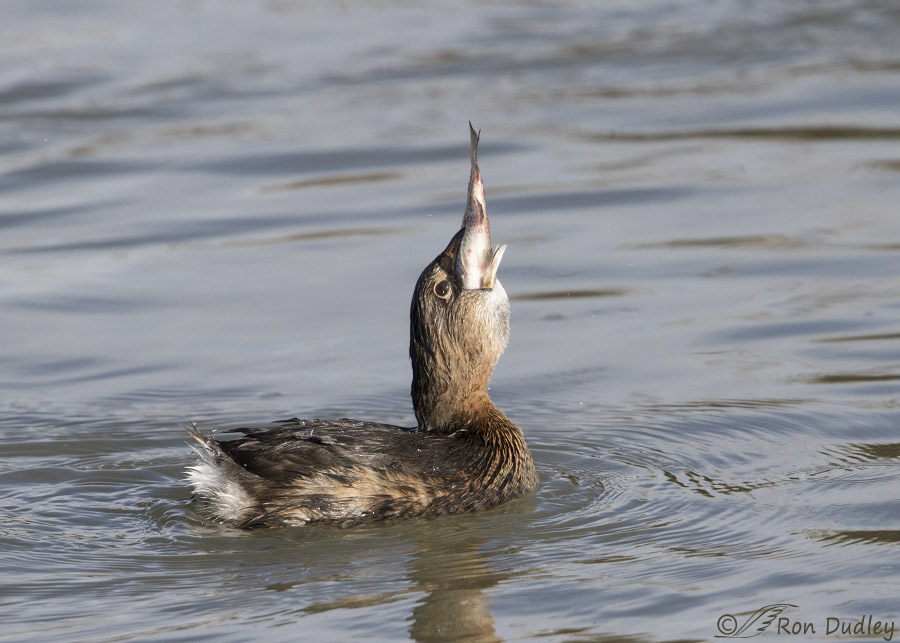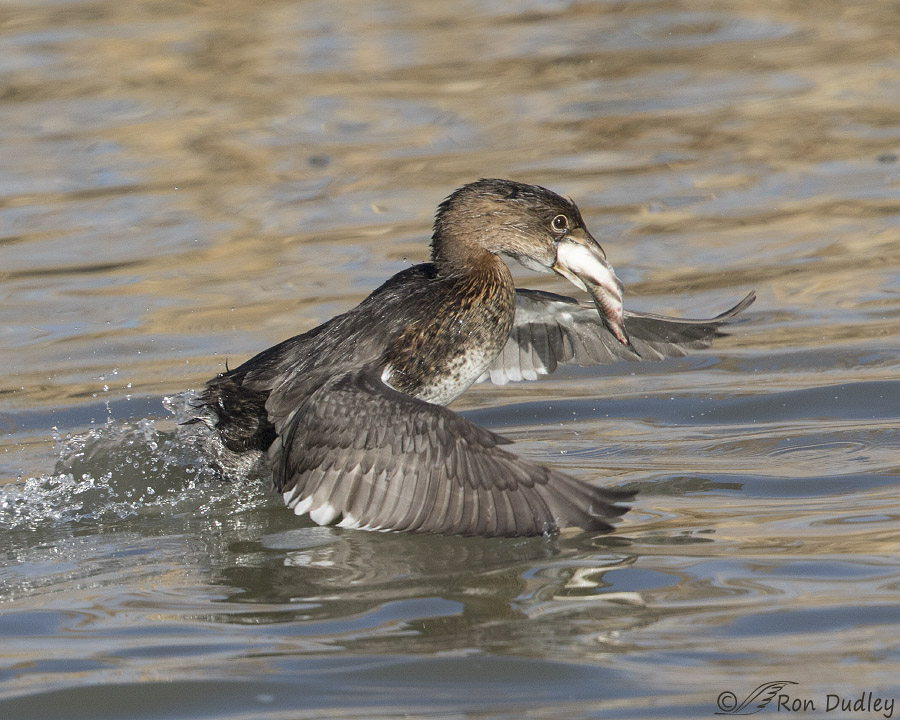Maybe some birds are “smarter” than we think they are.
Three years ago I witnessed a near feeding frenzy of Pied-billed Grebes at Farmington Bay WMA. Over a relatively short period I photographed multiple grebes as they caught and fought over fish. The action was hot and heavy and some of the fish were approaching a size that was too large to swallow which resulted in some interesting behaviors.

1/1600, f/6.3, ISO 500, Canon 7D Mark II, Canon EF 500mm f/4L IS II USM + EF 1.4 III Extender, not baited, set up or called in
I took this shot soon after the grebe emerged with the fish so it hasn’t yet had time to turn the carp around so it could be swallowed head first (as they always do). The bird was far away but I wanted to include the photo to show the size of the fish relative to the grebe. I found it hard to believe the grebe would even try to consume such a large meal. But it did and I took several hundred photos during the drawn out attempt.

1/4000, f/6.3, ISO 640, Canon 7D Mark II, Canon EF 500mm f/4L IS II USM + EF 1.4 III Extender, not baited, set up or called in
And it used a technique that I rarely see from this species to facilitate the swallowing process. In birds the size of a meal is limited by the diameter of the gape (the attachment points of the mandible and maxilla) and obviously when the meal is marginally too large to pass through that opening birds don’t have hands to force the issue. So this one used the only other tool available – gravity. And it used that tool as efficiently as possible by tilting its head until it was perfectly vertical to get all the “push” from gravity that was available.
Birds often use gravity in this manner but I seldom (if ever) see this species use it so efficiently by tilting their head until it’s perfectly vertical (though I have seen larger birds like some herons do it). And that got me to thinking – how did this bird know that perfectly vertical is the most efficient angle for a fish that might be too large to swallow? I don’t believe a human toddler would automatically know it in a somewhat similar situation.
I suspect in both cases it’s a learned behavior (rather than innate) – learned from trial and error.
On a different level the more I look at this image the more I like it for its uniqueness. Straight lines and right angles are fairly unusual in nature but the angle formed by the body of the bird and it’s extended neck is a near-perfect right angle and that angle continues with the fish. Even that floppy fish tail is sticking straight up to complement the effect and I think that’s pretty neat (apparently I’m easily amused).
Ok, back to the attempted meal. Was the grebe able to swallow the fish?

1/4000, f/6.3, ISO 640, Canon 7D Mark II, Canon EF 500mm f/4L IS II USM + EF 1.4 III Extender, not baited, set up or called in
I don’t know. The grebe spent a long time trying to get it down and then another grebe tried to steal it away and I was able to get this shot as the original “owner” sped off with its prize. After this the bird dived underwater and I lost track of it. It may have succeeded or the fish may have been released. I’ve seen both happen in the past.
One final note. I realize that birds “swallowing vertically” may seem like a tenuous claim to intelligence but it’s still my contention that it’s something that has to be learned and we shouldn’t just take it for granted. Perhaps that’s a reach but I don’t think so.
Ron
PS – I can’t resist mentioning something else in a completely different realm. On my blog I often have to use the past tense of “dive” so I have to choose between dove and dived. Typically I choose the latter but Merriam-Webster says that both are correct. To me neither sounds ideal but I have to make a choice. Does that choice ever bother anyone else?


Diven? Diveded? Doverino? I say make up your own! 😉 (Sorry, Patty. 😉 ) In any event, this bird is pretty amazing!
Dismissing the intelligence of other species is a common arrogance which gets my back up. Big time. Much like the common 3 second rule for goldfish. The slightest observation would show it up as faeces of bovines.
Loved this series and hope that the grebe could get that humungous fish down. And find somewhere quiet to digest.
Yeah, that we’re-the-best thing gets me all riled up, too. I’m just not seeing it and the outrageous arrogant hubris gets on my last darn nerve!
I hope the grebe swallowed the fish too, EC. Can’t remember for sure but I think I lost track of it.
Ron, those are very interesting pictures and I don’t care about the words you choose to use. I do not like people who criticize what we say or write. This is why I don’t talk or make comments to people. I have a cousin who does this with spelling errors. It is my pet peeve just as the problem they comment on is their pet peeve. They are not going to correct the world, they just need to enjoy the pictures and keep their suggestions to them-selves.( Ha Ha) Our English language is bad enough.
Trudy, the only one who’s putting pressure on me to use correct spelling and usage is me. Errors like those often distract some readers, breaking their train of thought from my text/photos and I don’t like that so I try hard to avoid it.
Very interesting series. Personally, looking at these photos too long activates my gag reflex. I guess I’m also easily amused because I really like the straight up and down fish – it seems pretty amazing that its tail is straight, too. As for your word dilemma, I originally learned the past tense of dive as “dove”. Its a word I don’t use often, so I really had to think about it. Dove is shorter, easier, but could also be confused with a bird… Oops, I think I’m rambling.
I like that straight tail too, Susan – a lot. For me it finishes off the pose of the bird perfectly.
As a professional writer/editor, I would go with dove rather than dived. Just my inherent style, but dove is a more correct past-tense form of the word dive (present tense), despite that it might be confused with a dove, but that’s another discussion. Context SHOULD take care of that confusion, but there are some people… Anyway, one thing I see writers do consistently is they wander out of past tense. I have to keep reminding them that they’re reporting something that happened in their past, not in their present. There’s a t-shirt I need to get that says something like “I’m silently correcting your grammar, because yes, I carry a big red pen in my mind 😉
Now, back to the grebe (and what a wonderful series of images!) and its intelligence. The prevailing human argument during the course of my life is that humans are the biggest and best critter ever to walk this planet, and thus, since critters are less than us, we have no reason to pay ANY attention to their intelligence/ways of learning. IF we recognize any intelligence at all, we chalk it up to instinct, which we disregard as anything that’s significant or worthy of our attention. When we’ve tested their intelligence, the test is often based in comparing it to our intelligence, in short, judging a fish’s intelligence based on its ability to climb a tree!
Even as a young child, I’ve poo-pooed that idea because that dog just won’t hunt when you consider the realities beyond our justification of we’re the biggest and best, for which we have NO empirical evidence beyond our steadfast belief. We must look at a bird’s/critter’s/fish’s intelligence based on their survival realities, their environment, their priorities, and how they operate within THEIR culture, if you will, and not within their ability to operate in OURS. So, within that grebe’s culture/way of being in the world, of course that grebe would understand the realities of gravity. Of course, they have their own language to operate within their world. Of course, they’ve learned by trial and error (much like SOME humans–although some insist on doing the same thing over and over, expecting a different result) and of course, they use their instinct, which in my world is perfect intelligence, installed at the factory.
Sooo, I tend to look at things more from a Native American perspective in that we share this spinning rock with a bunch of different cultures. But different does NOT mean less than. It just means different and we have a lot to learn from other cultures. I’m now stepping down from my soapbox 😉
I want to thank you for opening up a whole new species to me with the grebes. Admittedly, I haven’t spent a lot of my life around water, so my knowledge of folks who live in the water is lagging way far behind my other knowledge. From your images, I’ve come to really like grebes and who they are a lot! Just goes to show that I can usually tick off that learn-something-new-every-day task from my to-do list just by reading your blog!
And I would suspect that grebe finally managed to get that fish down, all thievery aside. Most critters on this planet are persistent in the food acquisition arena. 🙂
“different does NOT mean less than”
Exactly, Laura. I strongly agree.
That choice and some other similar ones have bothered me for years…a couple of mistakes I hear frequently are “drug” for dragged, “lay” for lie, “waked” for woke, or awoke, etc. Good to know both dove and dived are OK…Some the fish these birds swallow are so big it”s a miracle they get them down and don’t choke…When the alewives are running in the Mills in Maine, sometimes gulls are so greedy, they can’t get the fish all down and run around with half swallowed fish hanging out of their bills…they appear too stuffed to fly….I wonder if that bird ever actually got that big fish down…and how long before it got huntey again if it did…..as for intelligence, Inam convinced that ALL animals, even insects, are smarter than we arrogant humans think….
I love “huntey”. I’m probably going to steal that one…
Great shot Ron. Interesting behavior, certainly observations I rarely if ever witness. I guess we just don’t have a large enough food supply or at least a visible one.
Dick, the carp in this pond are so numerous that the grebes don’t have to work very hard at all to get their fill. And for me that’s (selfishly) disappointing because they spend most of their time sleeping during winter.
Since both are acceptable I use which one sounds (out loud) more fluid in the sentence it is used. Perhaps akin to finding the better angle to swallow a large fish.
I like your analogy, Brett. :0
I love the 2nd shot the best. First time I saw a bird do this, i seriously thought it would choke & need the Heimlich. But unlike humans, other species don’t bite off more than they can chew (or swallow). Since this is a birding blog, i agree it’s a better choice to use “dived”.
Elmer, I guess I go with “dived” just because it’s been acceptable the longest. Dove only became “correct” relatively recently.
Only if you call “relatively recently” during my time on this spinning rock, Ron! Don’t forget, I’m a geezer now 😉
Laura, from Merriam-Webster: 🙂
“Who’s right? Both of them. Dive is a regular verb whose past tense, since about 1300, has been dived. But in the 1800s, it suddenly gained an irregular past tense—dove.”
OK, I haven’t been on this planet since the 1800s, but I grew up with dove. I wonder if that could be a regional thing? Or just the preference of teachers in Cuyahoga Falls, Ohio? Who knows? Oh well…life is just full of contradictions 😉
Great photo of the swallowing process. This spring I was amazed to watch a cormorant swallow a huge catfish it had caught.
Some birds are amazing in what they can swallow.
WOW! Wonder if they ever choke or are able to get rid of it if it’s just TOO big? I think that would have to be learned given their somewhat varied diet. Critters certainly are capable of “learning”. Of the flock of Blue Jays we had only the one that has stayed has figured out how to use the feeder which is designed for smaller birds – took a while, but it has figured it out and has improved it’s technique as time as passed. 🙂 Dived/Dove – either works for me! 🙂
Judy, I’ve never seen any choke but I’ve often expected them to. It’s fairly common for them to eventually abandon the fish when it becomes obvious that it’s too big to swallow. They’re sure reluctant to do it though.